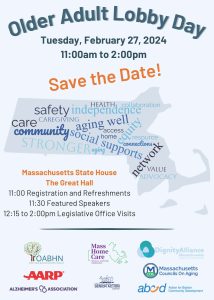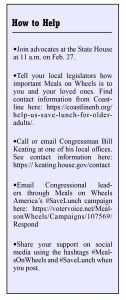Massachusetts organizations who support the growing number of older adults in the state are rallying to raise awareness of the age group’s needs and are inviting the state’s older residents to join them.
Issues affecting older adults are not often at the forefront of people’s minds, including those of legislators, said Betsey Crimmins, executive director of Mass Home Care, the statewide agency representing the state’s Aging Services Access Points.
That needs to change.
“Our society sort of has its head in the sand around these issues,” Crimmins said. “Given our demographics, how quickly the aging population is expanding right now, and the need there, we need to resurrect this (advocacy) event.”
Mass Home Care and the state’s 25 regional ASAPs have been responding to growing numbers of people needing services as the Baby Boomer generation ages.
In Massachusetts, adults age 65 and older represent nearly 18 percent of the state’s population, or about 1.3 million people, according to U.S. Census data, up from 14 percent 10 years ago.
And the numbers are still increasing.
“Look at the 2020 census, the wave of older adults is already here,” said Crimmins. “They’re not going away. Their needs and their issues are not going away and we really need to be prepared for this.”
The planned Older Adult Lobby Day is being held in response to these needs and will focus on issues including funding existing programs, the lack of affordable housing, and the need for more caregivers and personal care workers. In addition to Mass Home Care, there are seven organizations collaborating to make the day happen including AARP, Mass Senior Action, and the Massachusetts Councils on Aging.
The growing numbers of older adults is also straining local senior centers, according to Massachusetts Councils on Aging Executive Director Betsy Connell, who said councils on aging in the state are seeing a massive increase in older adults coming in.
“In part due to the mushrooming aging population but also as a result of people learning about their COAs during COVID,” said Connell. “(Senior Centers) are the busiest they’ve ever been. I’m hearing this across the board.”
 “One of challenges is looking at older adults who may have been middle income or borderline low, and between inflation and the fact they’re outliving their savings are struggling,” Connell said, suggesting another way numbers are growing.
“One of challenges is looking at older adults who may have been middle income or borderline low, and between inflation and the fact they’re outliving their savings are struggling,” Connell said, suggesting another way numbers are growing.
One of the programs specifically in jeopardy is senior nutrition, often known as Meals on Wheels in the community. The program provides hot nutritious lunches for older adults who need them.
At Coastline Elderly Services in New Bedford, senior nutrition served 400,000 home-delivered and group lunches in 2023, a number that represents a 56 percent increase from 10 years ago, according to CEO Justin Lees.
These lunches provide hot nutritious food to older adults and a regular check-in, in some cases the only person an older adult will see that day. But the need is outpacing funding, Lees said, and has been for several years.
“The program runs at a deficit which we struggle to overcome each year, so we don’t turn anyone away. Each year that gets harder as both expenses – wages, food costs, and fuel – and the numbers of older adults needing meals goes up.”
Lees said Coastline and other ASAPs have requested increased nutrition funding from legislators in the past. So, the state budget cut of $1 million from senior nutrition — reducing it to below fiscal year ‘23 funding — is especially devastating.
“We continue to serve more meals at higher costs each year. There’s a point where that will no longer be possible if funding doesn’t keep up,” he said.
In a statement, the state’s Executive Office of Elder Affairs told the Boston Globe that the budget cuts are not a lack of commitment to issues affecting older adults and pointed to specific funding decisions including a past increase in the rate councils on aging receive per older adult in their community. That amount is now $14 per senior, they said.
Connell said more is needed and that MCOA is asking for $15 per elder. “Think about it. $15 per elder in the community that’s less than minimum wage,” she said. “The only state funding that the COAs receive is through that line item.”
Crimmins said we need to move from reacting to preparing. “That’s why the (state’s) ASAP network is so important because we’re there when people need us,” she said. Lobby Day events at the State House on Feb. 27.
The day begins in the Great Hall with registration and refreshments at 11 a.m. Speakers start at 11:30 a.m. and legislative office visits will be held from 12:15 to 2 p.m.

Recent Comments